Iran Slams US Envoy's Critique of Iran's Election Fairness
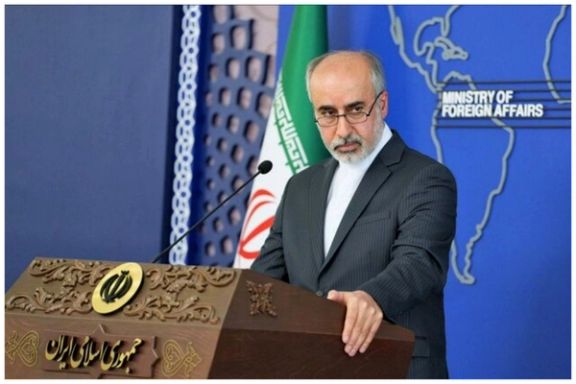
Iran's Foreign Ministry spokesman, Nasser Kanaani, criticized the US acting special envoy's criticism of Iran's snap presidential election, labeling them as "outrageous meddling."

Iran's Foreign Ministry spokesman, Nasser Kanaani, criticized the US acting special envoy's criticism of Iran's snap presidential election, labeling them as "outrageous meddling."
Kanaani expressed his disapproval on Friday, stating, "The meddling statements from the US regarding our presidential elections are a blatant and outrageous intrusion."
US acting special envoy for Iran, Abram Paley asserted on Wednesday through his social media account that there is "no expectation of free and fair elections or fundamental change in Iran’s direction."
Kanaani went on to say, "The US authorities persist with such baseless remarks, but the Iranian people will respond vigorously with their active and enthusiastic participation at the polls, as they have done historically."
Paley highlighted that the Guardian Council hand-picks the six candidates and noted severe limitations on Iranian voters' access to "even the most basic freedoms; necessary features of any democracy."
"In the face of the authoritarian regime’s long history of harassing and intimidating journalists, suppressing election coverage, and denying freedom of peaceful of assembly, we support the Iranian people," he said.
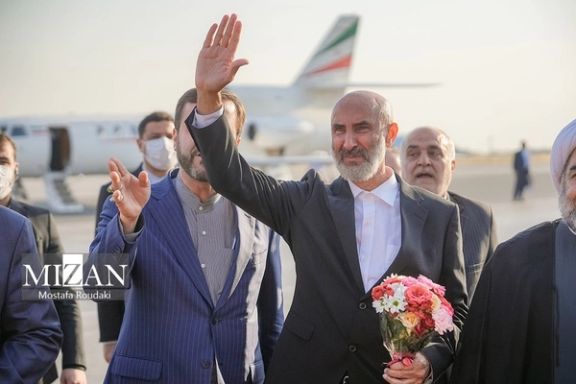
Fifteen diaspora Iranian political and human rights organizations have criticized Sweden's release of former Iranian official Hamid Nouri, convicted of war crimes, in a prisoner exchange with Tehran.
In a letter to Swedish Prime Minister Olaf Kristerson, they warned that such agreements encourage the Islamic Republic to hold foreign citizens and dual nationals hostage.
Signatories include the Pro-Republic Iranian Society in Sweden, the Committee for the Defense of Human Rights in Iran-Austria, the Republican Iranians of Australia, and the Khavaran Justice Seekers, which represents families of thousands of prisoners killed in Iran in 1988.
The letter, published on Friday, emphasized that releasing Nouri has “severely damaged the Swedish government's reputation.”
Earlier this month, Sweden repatriated Nouri and secured the release of two Swedish citizens, Johan Floderus and Saeed Azizi, who had been detained in Iran on allegations of "spying for Israel." However, the deal did not include Ahmadreza Djalali, a Swedish-Iranian currently on death row, who has been on a hunger strike since June 26 to protest being excluded from the exchange.
Sweden’s Prime Minister expressed regret that Iran was unwilling to negotiate for Djalali’s release, acknowledging the dire situation of the hunger-striking prisoner. He also cautioned citizens against travel to Iran.
Amnesty International condemned Nouri's release, calling it a “stunning blow to survivors and relatives of victims” of the 1988 prison massacre in Iran.
Nouri had been sentenced to life imprisonment by a Swedish court in 2022 for crimes against humanity related to his involvement in the mass executions of prisoners in the 1988.
His arrest in Sweden was based on the principle of universal justice, and his trial and conviction were hailed as significant steps for international justice. However, his release has faced widespread condemnation.
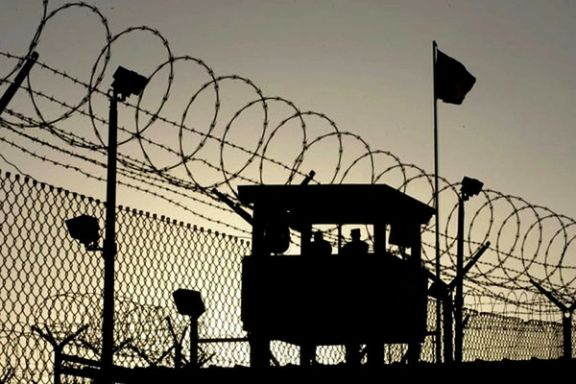
Human rights groups report that prisoners in Saqqez in western Iran, are being compelled to participate in Friday's presidential election under threat of penalties.
According to the Kurdish human rights organization Kordpa, which shared images of the messages sent to prisoners, they are asked to vote on Friday. The message tells prisoners that their families should also vote.
Failure to participate in the election results in being marked absent, leading to penalties such as three to six months imprisonment or up to 74 lashes based on law governing unverified absences.
Meanwhile, the Islamic Republic faces the challenge of reconnecting with a deeply disillusioned electorate. Official statistics reveal a stark decline in voter participation: 40.6% in the recent parliamentary elections, with Tehran recording its lowest turnout at 24%.
The run-off elections saw even lower participation, with only 7% in Tehran.
Simultaneously, numerous student organizations, women's groups, youth associations, and political activists have called for an election boycott.
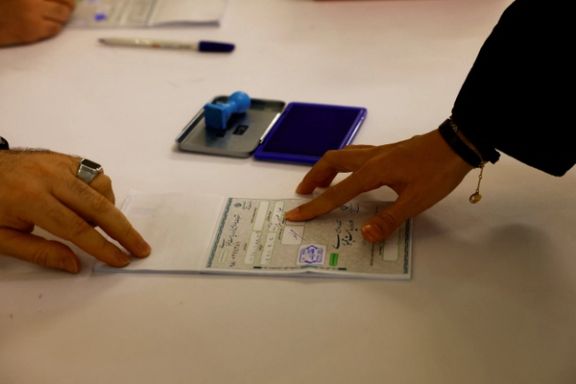
Pro-participation and pro-boycott Iranians are using a host of arguments to convince each other to vote or not vote in the June 28 snap presidential elections.
The primary argument of those determined not to vote is that participating gives credibility to an election that is neither fair nor free, and that a high turnout will be used as proof of the legitimacy of the political establishment controlled by Supreme Leader Ali Khamenei.
In contrast, those in favor of voting argue that a low turnout will neither hasten the downfall of the ruling establishment nor lead to its international isolation, as advocates of boycotting hope.
Many also argue that the political establishment has already engineered the outcome by restricting the competition to six hand-picked candidates. They point out that at least four hardliners were pitched against a pro-reform and a conservative candidate with little chance of winning to ensure a high turnout.
Graffiti in Ekbatan, Tehran, where ballot boxes are marked as “Deceit Box”
Turnout in similarly engineered 2021 elections which led to Ebrahim Raisi’s presidency was 41 percent, the lowest in the history of the Islamic Republic. So far the turnout on Friday is estimated to be under 50% to as high as 55 percent of nearly 61 million eligible voters.
No to voting graffiti
Most of the arguments in favor of voting pertain to pro-reform Masoud Pezeshkian who appears to have become a serious danger to hardliner hopefuls Saeed Jalili and Mohammad-Bagher Ghalibaf. Both have stubbornly refused to let the other carry the hardliners’ torch to prevent votes from splitting between them but withdrawal of one in the other's favor may be announced as hours before the ballots open.
Supporters of hardliners/conservatives need no encouragement to vote as they consider voting a religious duty. Many of those who advocate participation now, however, were initially against voting but have decided to vote for the pro-reform candidate Masoud Pezeshkian only to stop either Jalili or Ghalibaf from winning.
Street trash bin with “Ballot Box” graffiti
This group has a host of arguments to justify the call to support Pezeshkian. Many of them admit that the president’s powers are very limited by the Supreme Leader who has the first say in the choice of vice presidents and cabinet ministers, particularly the ministers of foreign affairs, intelligence, and interior, as well as the chief of police and many other top officials.
They also admit that the current power structure does not allow any significant structural reforms to take place but this is a chance to make a difference, however small, given the “tiny whole” that has been opened by allowing Pezeshkian stand in so “things can get a little better at least,” they say.
Women appear to be in majority among the pro-boycott as even the pro-reform candidate has failed to present an acceptable and progressive plan for addressing the varied demands and grievances of women. Accordingly, the number of women in Pezeshkian’s campaign meetings was visibly small compared to men.
Many political and civil groups have issued statements for boycotting the elections and many others are campaigning for it individually on social media.
The United Youth of Iran (UYI), an underground pro-democracy youth group that came into being during the 2020-2021Woman, Life, Freedom anti-government protests is one of the groups that has boycotted the elections. The next government will only perpetuate crimes and human rights violations like its predecessor, they argue.
“We will not vote for the murderers of the Iranian youth,” the UYI which has campaigned for boycotting the elections on social media and graffiti in urban areas says.
The underground gnostic/alternative medicine Taheri Movement is another group that has announced that they will boycott the “show elections “because they find the system “unreformable”.
The movement that quickly spread among educated Iranians in the 2000s takes its name from its leader/guru Mohammad-Ali Taheri. It still has a big following estimated at over a million.
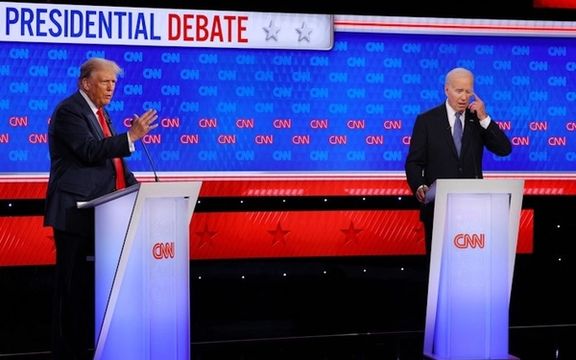
US President Joe Biden and former president Donald Trump clashed over their Iran record in their first televised debate Thursday night, with each accusing the other of weakness and neither offering a clue about their policy towards the Islamic Republic.
Both candidates referenced Iran despite there being no questions about the country. The bulk of the 90-minute program focused on US domestic issues, particularly immigration and the economy.
When discussing foreign policy, the focus was on the war in Ukraine, followed by the crisis in Gaza and the possibility of a ceasefire between Israel and Hamas. Iran was invoked only as an attack line by both sides, with no insight into how the next US administration may deal with the Islamic Republic and its Revolutionary Guards.
“Iran was broke. Anybody that did business with Iran, including China, they couldn’t do business with the United States. They all passed,” Trump said, claiming success in curtailing Iran’s anti-American activities in the Middle East. “Iran was broke. They had no money for Hamas, Hezbollah, for terror. No money whatsoever.”
Trump’s 'maximum pressure' campaign sharply reduced Iran’s oil revenues. The trend did change, however, during the last months of his tenure –and was cemented once Biden took office and set in motion his plan to revive the 2015 nuclear deal that Trump had unilaterally voided in 2018.
Surprisingly, Iran’s nuclear program got no mention, even though both candidates have many times vowed to do ‘everything’ possible to stop the Islamic Republic being armed by a nuclear bomb, calling it “the world’s biggest state sponsor of terror”.
Biden did not offer any direct defense of his Iran policy. Instead, he attacked Trump for not doing much outside tough speech. “Iran attacked our troops, but [Trump] did nothing,” Biden said, apparently referring to the retaliatory targeting of US base Ayn al-Asad following the killing of Iran’s top military man, Qasem Soleimani. “He called our troops’ brain injuries minor headaches.”
In spite of clear differences in outlook and style, the two candidates seemed to share the desire to appear tough on Iran, especially following the October 7 attack on Israel, which many believe would not have happened without Tehran’s support for Hamas.
Trump claimed once more that the October 7 Hamas attack on Israel would never have happened under his watch. He accused Biden of destroying the United States and losing the respect of the rest of the world. Biden pointed out that he had mobilized “50 countries” to defend Israel when Iran launched dozens of drones and missiles towards Israel in April.
The talking points will likely continue beyond Thursday’s televised debate, and Iran will likely feature again in both candidates’ election campaign –perhaps not as heavily as many expected, however, if the first debate is anything to go by.
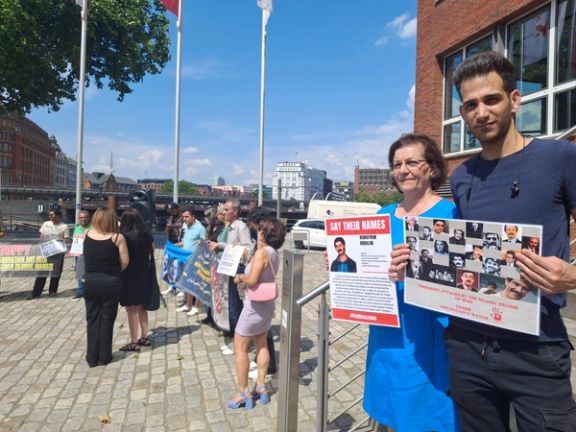
The Iranian-American campaign to oust a former top official of the Islamic Republic from his job at Princeton University reached the northern German port city of Hamburg on Thursday.
Roughly forty Iranian-Germans protested against Seyed Hossein Mousavian and his relations with a largely pro-Islamic Republic German think tank.
The California-based organization, Alliance Against Islamic Regime of Iran Apologists (AAIRIA), launched a campaign against Mousavian in March after it was revealed that he allegedly played a role in the assassinations of at least 24 Iranian dissidents in the 1990’s.
The prominent German-Iranian dissident Mina Ahadi spearheaded the protest in front of the think tank Körber Foundation in Hamburg. Mousavian was the Islamic Republic’s ambassador to Germany from 1990 to 1997 when Iran’s regime assassinated Kurdish dissidents in a West Berlin restaurant Mykonos in 1992.
Ahadi told Iran International that Farah Madaen spoke against Körber’s “dialogue” with Mousavian and the regime in Tehran. Madaen’s three brothers and sister were executed by the Islamic Republic in the 1980’s for dissident activity. “We don’t where there bodies are,“ Madean said at the protest.
Körber is under fire for recently inviting Mousavian to Hamburg for an event. The controversial German organization has long courted Mousavian as one of its key speakers.
“This campaign has showed that Körber cannot repeat something with Mousavian unless they do it secretly, “said Ahadi.
Maria Mahmoudi also delivered a speech at the protest. The Islamic Republic executed her husband, the Iranian-Kurd, Mohammad Faramarzi, and three other Kurdish dissidents in January, for alleged links to Israel.
AAIRIA has urged Princeton University to fire Mousavian and called on Körber to swiftly sever ties with Mousavian.
Ahadi and two other German-Iranians, Jasmin Maleki and Ali Ertan Toprak, were present at a Wednesday meeting with Körber representatives, Thomas Paulsen and Julian Claaßen. Ahadi posted a picture on her X account from the meeting.
Ahadi told the Körber officials that the German community wants the foundation to conduct “an interview with us in order to respond to Mousavian.” Körber interviewed Mousavian and posted the question and answer session with him on its website.
She also expressed the Iranian diaspora’s “criticism of Körber’s appeasement policy” toward the clerical regime during the meeting. Ahadi requested that Körber hold an event with German-Iranians who oppose the Islamic Republic.
The organization International Women in Power also condemned Körber in a statement, for “providing a platform to Mousvian who worked for the brutal Iranian gender apartheid regime and is known for defending the fatwa against Salman Rushdie.”
Mousavian has strongly endorsed a so-called Iranian fatwa ordering the murder of the British-American writer Rushdie. He defended the fatwa during interviews with German media outlets and told Spiegel magazine about Rushdie: “I hate him. He insulted my religion, my prophet, the laws.”
Mousavian also supports the German and US-designated terrorist entities, Hamas and Hezbollah.
Körber was founded by the former Nazi, Kurt Adolf Körber (1909-1992), who exploited concentration camp victims to advance the Holocaust and Adolf Hitler’s war goals.
When asked about Mousavian’s support for the antisemitic terrorist organizations, Hamas and Hezbollah, and the comment from Daniel Killy, a member of the advisory board of the Jewish community of Hamburg, who demanded that Körber stop “inviting apologists of the Mullah regime," the commissioner tasked with fighting antisemitism in Hamburg, Stefan Hensel, refused to comment.
Killy told Iran International that Körber should “sack the people within their foundation being responsible for the invitations over the years." Körber took credit on its website about a delegation it sent to Iran in 2017. Iran International has learned that Körber does not want the picture circulated. Iran International asked Körber and Körber AG about the names of its employees who were Iran and the nature of its business deals with the Islamic Republic.
The Körber Foundation and its parent company, Körber AG, did not immediately respond to Iran International press queries about Mousavian and its business relations with Iran’s regime..
Mousavian refused to answer Iran International email and WhatsApp press queries.